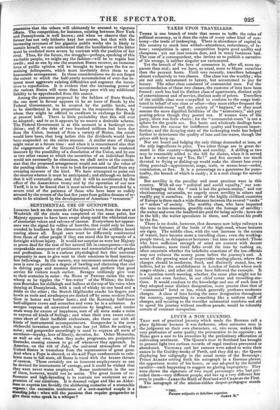TAXES UPON TRAVELLERS.
THERE is one branch of trade that seems to baffle the rules of political economy, as it does the rules of every other kind of eco- nomy—the trade of innkeeping. There is abundance of capital in
this country to stock inns withal—abundance, redundancy, of la- bour; competition is open ; competition begets good quality and cheapness : yet our inns remain dear, and in many instances bad. The case of a correspondent, who invites us to publish a narrative of his wrongs, is neither singular nor caricatured.
Yet the breach of the laws of commerce is, after all, more ap- parent than real; and we have, as usual, more to blame ourselves' than the peccant hosts. Until very recently, travellers belonged almost exclusively to two classes. One class was the wealthy; who are not only accustomed to luxury, but accustomed to pay for luxury. The other class consisted of commercial men. For the accommodation of those two classes, the customs of inns have been framed : each has had its distinct class of apartments, distinct style of entertainment and of service, distinct scale of prices. Travellers of the middle class were compelled to conform to the usage insti- tuted in behalf of one class or other—they must either frequent the " commercial-room " and the society of "bagmen," or they must assume the more dignified liabilities of the "aristocracy," and pay posting-prices though they posted not. If women were of the
party, there was little choice ; for the " commercial-room " is not a
sphere for the gentle sex. But haste and wholesale dealings have often been the excuse for indifferent quality and frequent imper- fection; and the decaying state of the innkeeping trade has helped further to deteriorate the quality of inns and inn-wares, though the prices still keep up.
Nor are board and lodging the only things demanded at inns, or the only ingredients in price. Two other things are in great de-
mand in this country—despatch and servility. A shilling or two may be reasonably added to the bill for dinner, when it is served as fast a waiter can say "Yes, Sir !" and five seconds too much devoted to frying or dishing-up would make the dinner lose every thing punctual—appointment, stage, train, or steatn-boat—order, commission, or fare. It is a percentage as a guarantee for punc- tuality, the breach of which is costly; it is a real charge for service done.
But servility is the peculiar and most precious ware in this country. With all our "political and social equality," our, con-
vivial bragging that the " rank is but the guinea-stamp," and our electioneering saturnalia, we eagerly covet servility in others and readily pay it ourselves. In none of the highly civilized countries of Europe is there such a vide distance between the several " ranks " or "orders" of society. The wealthy class, who have imparted the tone to inn-manners, greedily exact the homage of servility : the waiter and even the landlord are paid for being servile ; bows are in the bill; the waiter speculates in them, and realizes his profit in the fee.
There is no doubt, however' that dearness now helps railways to injure the fortunes of the lords of the high-road, whose banners are signs. The middle class, with the vast increase in the means of transit, have become more a travelling class ; even the working people travel, as delegates or lecturers : but inns are evaded. Those who have sufficient strength of mind are content with decent
public-houses; more timid folks avoid the inns by rushing on, often uncertain whether the indefinite exactions of the inn-officials may not exhaust the scanty purse before the journey's end. A sense of the growing want of respectable resting-places, where the
charges should be moderate, fixed, and distinctly stated, has, we believe, led to the establishment in London of hotels where such
usages obtain ; and other old inns have followed the example. It
is a question worth mooting, whether, the same plan might not be carried out even further, in our chief towns and travelling-sta-
tions. It would conduce to the knowledge and use of such inns if they adopted some distinct designation, more precise than that of " commercial" hotel or inn, which generally professes moderate
charges. A class of inns having the same designation throughout the country, approaching to something like a uniform tariff of charges, and securing to the traveller substantial comforts and aid to speed his journey without needless parade, would be tolerably certain of constant occupation.


























 Previous page
Previous page